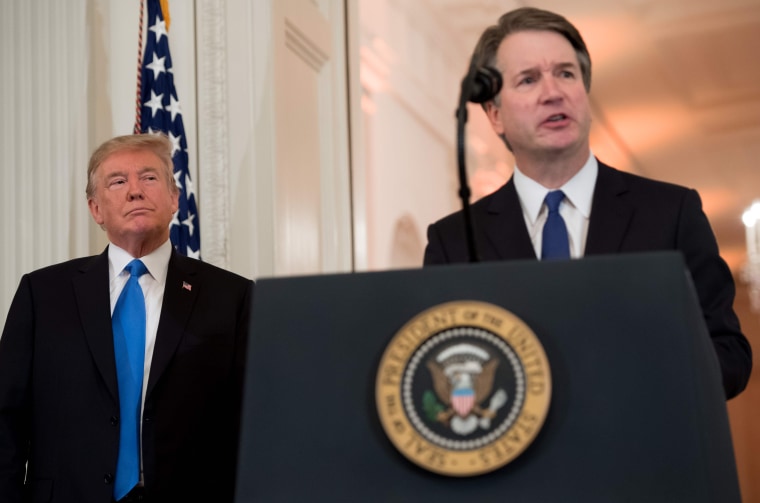Sen. Orrin Hatch (R-Utah) last week helped organize a curious political stunt. The Utah Republican wrote a joint letter with Republicans on the Senate Judiciary Committee to the panel's Democratic members, explaining how impressed they are with the committee's Republican chairman, Sen. Chuck Grassley (R-Iowa), and the work he's done ahead of Judge Brett Kavanaugh's Supreme Court confirmations hearings.
The point of the partisan endeavor was apparently to tell Dems, in writing, how impressed Republicans are with themselves. Indeed, among other things, Hatch's letter commended Grassley for conducting "the most thorough and transparent vetting possible."
I especially enjoyed the use of the word "possible" -- as in, there's simply no way anyone, at any time, could've done a more thorough and transparent job in reviewing a high court nominee's professional background. It's not even possible.
Meanwhile, in reality, there's a nearly three-year period from Kavanaugh's tenure in the Bush/Cheney White House that senators were supposed to be able to review as part of the vetting process, but which Senate Republicans have declared off limits for reasons they haven't fully explained.
Late last week, "the most thorough and transparent vetting possible" became even less thorough and far less transparent.
The Trump administration is withholding more than 100,000 pages of Brett Kavanaugh's records from the Bush White House on the basis of presidential privilege ahead of the Supreme Court nominee's confirmation hearing.The Senate Judiciary Committee was notified of the action Friday. George W. Bush's attorney Bill Burck told the panel it had essentially completed its work compiling documents, according to a letter obtained by The Associated Press. Bush directed them to err "on the side of transparency and disclosure, and we believe we have done so."But the current administration is also able to review the records, and the Trump White House "has directed that we not provide these documents," the letter says.
If there's a sensible defense for this, it's hiding well.
The context, of course, deserves special attention: Team Trump waited until late on a Friday, ahead of a holiday weekend, to announce that it's decided to hide more than 100,000 pages from Kavanaugh's records.
Senate Minority Leader Chuck Schumer (D-N.Y.) said in a statement, "We're witnessing a Friday night document massacre. President Trump's decision to step in at the last moment and hide 100,000 pages of Judge Kavanaugh's records from the American public is not only unprecedented in the history of Supreme Court nominations, it has all the makings of a cover-up.... What are they trying so desperately to hide?"
By way of comparison, it's important to note that one of Barack Obama's nominees for the high court, Elena Kagan, also had White House experience. And yet, the total number of pages the Democratic president kept hidden from the Senate was zero.
There's no shortage of substantive concerns related to Kavanaugh's nomination. In the coming days, senators should grapple with his far-right worldview, his eagerness to advance his political agenda, the evidence that suggests he may have lied to the Senate under oath, and even his controversial finances.
And while each of these angles matters a great deal, there's a foundational controversy that should, in theory, halt the process before it even begins: senators will not have an opportunity to review the nominee's record before weighing whether to reward him with a lifetime appointment to the nation's highest court.
Before Kavanaugh was even chosen for the vacancy, GOP leaders realized his extensive paper trail could pose a political problem. Trump and his Republican allies have found a way around that problem: they decided not to care.
Postscript: Last night, Bush lawyer Bill Burck, a former Kavanaugh colleague, released another 42,000 pages of materials from the Supreme Court nominee's past to the Senate Judiciary Committee (not to the public). If you're wondering how senators and their aides can read 42,000 pages of documents in one night -- the Kavanaugh confirmation hearings begin this morning -- the answer is they can't.
